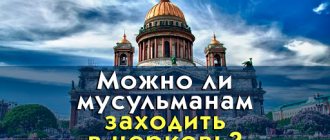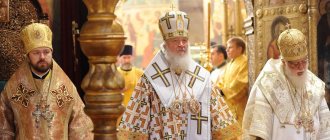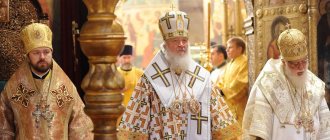Christian sects
Definition 1
A religious sect is a religious group of people who have separated from the main religion, while it can both profess traditional dogmas, remaking them in its own way, and create completely new ones.
Along with the main religious movements of Christianity, there are also numerous groups of believers, which are called sects. A sect includes followers of a single religion that has certain characteristic features.
In Tsarist Russia, sects were persecuted, their representatives were anathematized, but today any religious organization can legally exist if it does not cause mental or physical harm to people. All Christian sects, despite the differences in the conditions of their emergence, have common features:
Are you an expert in this subject area? We invite you to become the author of the Directory Working Conditions
- own organizations that differ from church ones;
- the life of the community is seen as a righteous world, contrasted with the surrounding sinful world;
- much attention is paid not to external rituals, but to the inner faith and conviction of a person;
- church services have been replaced by prayer meetings;
- the saving role of the church is denied;
- monasticism, veneration of icons, priestly vestments, crosses, relics, sacraments, etc. are rejected;
- the basis of doctrine is the Bible;
- carrying out active missionary activities.
How to recognize an “Orthodox” sect? 11 questions to yourself
Estimated reading time: 4 minutes.
Before entering into confidential contact with the leader and followers of any religious group - be it a monastery, parish, brotherhood, sisterhood, missionary community, etc., it is advisable to answer the following questions:
1. What is the history of this group and its jurisdiction? Don’t they say here: “All other monasteries (parishes, communities) are no good, you don’t trust them, but with us everything is as it should be!” Such phrases are a sure sign of a sectarian spirit.
2. Do the leader and members of the group have a delusion of persecution (“everyone is against us”) or dividing the world into “us” and “them”? Is a leader considered “persecuted” and “misunderstood” by others in the Orthodox world? Are outsiders viewed as “enemies”?
3. Is communication limited to those outside the group? Do they use the expressions “stupid”, “redneck”, “plebeian”, “worldly” and so on in relation to critics?
4. Have there been any occasions when group members have been asked to do something obviously illegal, immoral or humiliating? The trick here is that a person who has adopted a sectarian worldview can justify anything by “obedience,” or vice versa, by a sense of his own superiority.
5. Haven’t you heard statements like: “We don’t need bishops (or priests) or it’s not a decree”, “there are no more real bishops left”?
6. Are there any attempts to undermine the reputation of recognized authorities of the Church or sow doubts about their competence?
7. Even if the group is clearly living poorly, it is useful to find out whether new converts are being persuaded to donate (money, property, power of attorney for a loan). This question does not interfere with finding out even if you have entered a monastery: usually, before taking monastic vows, a novice is not required to part with personal savings, either for the benefit of the monastery or for the benefit of his family. A similar question is whether guests and relatives of community members are given special honors in order to lure large donations from them?
8. Are intimidation and accusations used to attract people into the group (“if you don’t accept monasticism, you will go to hell!”) or to keep them in it (“if you leave, you will die, you will return to your previous sin”)? Are they lying about those who left the group? It is known, for example, that a certain person left the community of his own free will, and the leaders stubbornly insist that he was “kicked out” as a libertine or a madman, or a disobedient person, instead of simply saying that the person did not have a calling to monasticism.
9. If you are a layman and go to church, should you get permission (blessing) from a priest from the community to change jobs, buy a car, etc.? Under normal circumstances, you should still have the final say in such matters; they should not be decided by a priest, no matter how wise and pious he may be. Of course, every Christian can - and should - ask for prayerful help and advice in his everyday affairs, but the imposition of his own will by a priest and the suppression of someone else’s is unacceptable.
10. If you notice that a community leader is distorting facts, does he justify this by saying that the group supposedly serves a “higher purpose”? In other words, is achieving the goal justified by any means necessary?
11. Are there any signs of megalomania on the part of management? In other words, do they not consider themselves and their group to be some kind of mentors, deliverers or saviors of the entire Church?
If the answer to at least one of these questions is positive, it is better to leave such a group: obedience has meaning and value only when it is voluntary and not forced, caused by fear, guilt or emotional blackmail.
Recently, many pseudo-patriotic organizations have appeared that entice believers with them, speculating on “correct” slogans. However, in the end, all their calls come down to the struggle against the hierarchy of the Orthodox Church. And what is especially sad is that some, usually young priests, are involved in this, with “Komsomol fervor” trying to literally drive unchurched people into the Church. Moreover, to the “church” that they invented for themselves.
It is clear that the reformers of the Church “want what is best” and the majority are sincere in their desire to “cleanse” the Orthodox Church from many abuses, which, unfortunately, are actually present in our parish practice. But at the same time they forget the main thing: the path of the Church cannot be identical to the path of social reforms, because in the end it is not we who will save the Church, but she who will save us.
Archpriest Alexander NOVOPASHIN has been studying destructive cults since 1993. The rector of the cathedral in the name of St. Alexander Nevsky, Novosibirsk. Heads an information and advisory center on sectarianism, working with people who have encountered the activities of sects and destructive cults and have suffered from them, a member of the editorial board of the anti-sectarian magazine “Ozrenie”, editor-in-chief of the diocesan newspaper “Orthodox Missionary”, chairman of the Orthodox brotherhood of St. Alexander Nevsky, director Diocesan drug rehabilitation center.
Continuing the topic, read:
Bishop of Saratov and Volsk LONGIN: SECT AS A DIAGNOSIS OF THE TIME
Baptistism
Baptistism was formed as a branch of Calvinism and supports all provisions of its doctrine. Followers of this trend baptize only adults. The main postulate of Baptists is the following: no one is able to choose a faith for a person, including parents. A person needs to accept faith consciously.
Baptists celebrate the main Christian holidays with triumph:
- Easter;
- Trinity;
- Christmas;
- Transformation:
- Ascension.
They also celebrate Unity Day on October 27 and the Harvest Festival. The only source of their beliefs is the Bible.
Finished works on a similar topic
Course work Christian sects 460 ₽ Essay Christian sects 240 ₽ Test work Christian sects 190 ₽
Receive completed work or specialist advice on your educational project Find out the cost
The first communities were formed in England in 1611-1612, their founder was J. Smith. Baptists wanted religious freedom, tolerance and separation of church and state, granting the right to preach to any member of the community. At the same time, two types of baptism developed:
- Private (particular) Baptist - its followers adhere to the Calvinist doctrine of predestination. They received this name due to the fact that they believed that only a part of people would be able to achieve salvation.
- General (general) Baptist - its followers believe that obtaining salvation depends on the people themselves, since Jesus, with his death, atoned for the sins of all people, and not just a select few. Their successors are Evangelical Christians.
Baptistism has become one of the largest denominations of Protestantism, whose centers are located in more than 122 countries. Baptistism has over 72 million followers. Baptists publish religious literature: the “Brotherly Messenger” magazine, church calendars, collections of religious songs.
Church attitude
Orthodox people believe that they have the fullness of the truth, but they do not always follow it. They often harshly criticize and despise people who attend, for example, a Baptist church.
But is this right? If a Baptist loves the Lord fiercely and is meek in disposition, mortifying his flesh for the sake of Christ, how can one treat him with contempt? This person is worthy of respect, because he strives for the same Lord as an Orthodox monk who lives in asceticism for the sake of mortification of the flesh. The Spirit of God breathes wherever it wants, and it is a terrible mistake to hate your neighbor for having different views. This applies, of course, only to Christian branches, Protestantism in particular.
It is very important for Christians to know the teachings of the Church and Scripture in order to resist heresy
Sectarians who belong to pseudoscientific, heretical teachings deserve only pity . How should an Orthodox person treat them? With pity and love, strive to tell him about the truth and attract him into the Bosom of the Church, but do not listen to his teaching and do not give in to the temptation to attend a meeting or other dangerous involvement in a sect. One should be wary of such gatherings, reading heretical literature or watching videos. If a sect operates on the territory of a parish, then the parishioner is obliged to report this to the local parish, but independently avoid attending heretical meetings and destroy all materials that it distributes.
Adventists
Adventism formed as a branch of Baptistism in the 30s of the 19th century in the USA. Adventists believe in the imminent second coming of Jesus, in the Last Judgment and the establishment of a thousand-year kingdom for the righteous, that is, Adventists. They deny the immortality of the soul and monasticism, they do not venerate icons, Christian saints, they do not worship relics and relics. The only rituals performed are communion and baptism.
There are several schools of thought in Adventism. The most common are Seventh-day Adventists, whose teachings are based on the Bible and the revelations of the American fortuneteller Ellen White. Saturday is celebrated by them as a day of rest. They believe in the imminent coming of Christ and in the beginning of eternal heavenly bliss after his second coming. Then Adventists will be resurrected to heavenly life, and all sinners will simply perish.
Adventism is characterized by active missionary activity and the payment of tithes to the community treasury.
Worship includes Bible reading, sermons, prayers and religious chants.
A number of rituals are performed:
- adult baptism;
- ordination;
- marriage, communion,
- washing the feet, which symbolizes equality and humility.
They pay much attention to the so-called “sanitary reform”. Adventists are prohibited from consuming pork and fish without scales, tea, coffee, alcohol, tobacco and certain medications.
All Seventh-day Adventists are governed by the General Conference, headquartered in Washington, D.C., convened every 4 years.
In Russia, Adventism was formed at the end of the 19th century in the southern provinces. The SDA General Conference was legalized in 1905.
Pentecostals
Definition 2
Pentecostals are a Protestant movement that arose in the United States at the end of the 19th century and spread from there throughout the world. The basis of this direction is the New Testament tradition concerning the descent of the Holy Spirit on the apostles on the fiftieth day of the resurrection of Jesus Christ, as well as the receipt by the apostles of the gift of prophecy.
The founder of the sect is priest Charles Fox.
Pentecostals believe that every true Christian can receive the visible gifts of the Holy Spirit: the ability to prophecy, the gift of healing the sick, speaking in different languages, etc. To be saved, every believer must achieve the indwelling of the holy spirit into his own body.
In Pentecostalism there are several trends that can be divided into five groups:
- Two blessing Pentecostals, which recognize the acceptance of faith, that is, the baptism of the Holy Spirit;
- Three Blessings Pentecostals, which recognize education, sanctification, and the new birth, as well as the baptism of the Holy Spirit;
- Radical Pentecostals who, in addition to conversion, recognize sanctification and the baptism of the Holy Spirit, as well as Divine healing, prophecy and the ascension;
- Apostolic Pentecostals, led by living “apostles” and “prophets” who adhere to the doctrine concerning the existence of one God in three persons;
- Unitarian Pentecostals who believe that there is one person of God rather than three.










